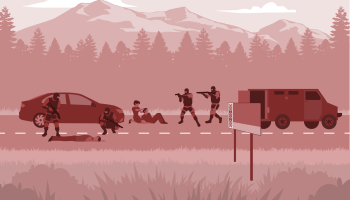CASE 1: The Fighter and the Law
On the night of June 8, 2017, Murad Amriev, a Chechen mixed martial arts fighter, was mistreated by Belarusian border guards at the Veselovka border checkpoint, which is on the Belarusian side of the border with Ukraine – the same stretch of border that was equipped by the EU. (See main story.)
According to Human Rights Watch reports, Amriev was fleeing persecution in Russia. On June 4, police detained him in the country’s Bryansk region for allegedly using a forged document and held him at a police station for 48 hours. By the morning of June 6, the police had yet to charge Amriev and, according to his lawyer, he was legally free to leave.
A group of Chechen police officers then arrived at the station, saying they were there to arrest Amriev. Amriev told his lawyer that he recognized one as having tortured him in 2013, when he was held for two days by officers seeking information about his older brother, who had fled Chechnya years earlier.
While his lawyer argued with them, Amriev managed to leave the building and evade the Chechen officials waiting for him outside. Taking advantage of the lack of border control between Belarus and Russia, he managed to get to the Veselovka border checkpoint between Belarus and Ukraine.
When Belarusian border guards checked his passport, they discovered that he had been placed on an international wanted list by Chechen authorities.
Plea for Asylum
Nasta Loika, a co-founder of the Belarusian human rights organization Human Constanta, which has worked extensively on the violation of migration procedures on the Belarusian borders, was involved in Amriev’s case.
“He was apprehended at the border checkpoint and brought to a separate room without furniture, where he was handcuffed and attached to a radiator,” Loika said.
“He spent around six hours sitting on the cold floor. During this time, his requests for water, food, and a toilet were ignored. Moreover, he was not told the justification for his treatment, especially given that he had never resisted and had complied with all orders.”
Early in the morning of June 9, Amriev was handed over to the police and brought to the small Belarusian town of Dobrush, where his lawyer visited him. Russian TV reporters also arrived and captured a video of him inside the police station, where he can be heard shouting from the window of the detention cell that his requests for asylum were being ignored.
At minute 30:50 in this documentary by ProtivPytok, a Belarusian human rights organization, Amriev can be heard shouting to lawyers and TV reporters that he wants to seek asylum in Belarus.
According to Loika, Amriev was handed over to Russian security services later that same day.
Numb Hands
In the same documentary, Amriev says that even after four or five months, he still can’t fully feel his hands because of the way he was handcuffed.
Nasta Loika said Amriev also suffered a back injury from being forced to sit on the floor. She argues that the border guards did not have grounds to place Amriev in handcuffs because he complied with the police’s orders without resisting.
“The grounds for his apprehension was not a terrorism charge, but rather an accusation of document forgery. Finally, forcing a handcuffed person to sit on a concrete floor for six hours definitely amounts to unjustified, degrading treatment,” said Nasta Loika.
Loika said she helped Murad write complaints to the prosecutor’s office and the State Border Committee (SBC). After the reviewing the complaint, the SBC ruled that no violations had taken place.
In response to questions about Murad’s case, SBC spokesman Anton Bychkovskiy wrote in an email that the border guards had followed the law.
“[This] is also a common European and world border guard practice,” he wrote. “Further inspections and decisions regarding each particular case are beyond the competence of the border guard service. If any person reasonably believes that he was mistreated, then he has the right to file a complaint, which will be necessarily considered. It is also applicable to the mentioned case with Murad Amriev.”
CASE 2: Back to Chechnya
In March 2017, Imran Salamov and his family — all Russian nationals of Chechen origin — left Chechnya in fear of persecution by the authorities. Like many Chechens before them, they stopped in the Belarusian town Brest on their way to Poland, an EU member country, where they planned to apply for asylum. But they never made it past Brest.
The family arrived on March 21 and made eight attempts over the next eight days to apply for asylum in Poland. According to Human Constanta, which assisted the family in asylum proceedings, Polish border guards repeatedly ignored their requests for asylum and returned them to Belarus.
On their ninth attempt, early on the morning of April 5, 2017, Salamov and his family passed through passport control at a Belarusian border checkpoint at a train station in Brest.
But on that morning, Salamov was prevented from leaving Belarus. According to Human Constanta, SBC officers annulled an exit stamp that had been placed in his passport a few minutes earlier before interrogating him for about 40 minutes about the purpose of his stay in Belarus. Salamov was subsequently released. The same sequence of events was repeated the following day.
“The SBC has no right to deny someone exit from Belarus without an appropriate reason,” said Nasta Loika.
On the morning of April 13, Salamov and his family made yet another attempt to leave Belarus for Poland. They passed through passport control at the train station as usual, but this time, Salamov was apprehended by SBC officers and handed over to the police.
It was later revealed that, on the evening of April 5, Chechen security services had opened a criminal case against Salamov and placed him on an international wanted list for allegedly assisting a member of an illegal armed group. According to documents sent from Chechen to Belarusian authorities, the alleged ”assistance” amounted to purchasing 10 pairs of underclothes, two pairs of shoes, and food.
The Belarusian police decided to hold Salamov in detention prior to deporting him to Russia. While in detention, Salamov applied for international protection in Belarus, claiming that he would be tortured in Chechnya. When his application was rejected in August 2017, he legally had 15 days to appeal the decision during which time authorities could not remove him from the country. However, Salamov was expelled two days before the 15-day appeal period.
According to an Amnesty International report from November 2017, though Salamov’s “lawyer and wife met with him at the City Police Headquarters in Grozny on September 11th, all subsequent efforts to locate him have failed and the authorities had claimed he is not in their custody.”
Nasta Loika said she “doesn’t know the real reasons behind two instances when Imran Salamov was denied exit from Belarus” but her guess is that “this could have happened in accordance with an agreement with Belarusian migration services, which in turn were asked by Chechnya’s authorities.”
“It can be said the border guards apparently violated Imran’s rights but it’s impossible to say that they are directly responsible for his disappearance in Chechnya,” she added.
This investigation was financially supported by a grant from the IJ4EU fund.






